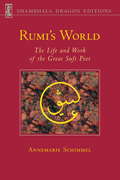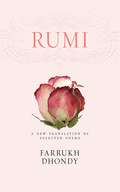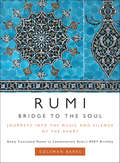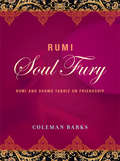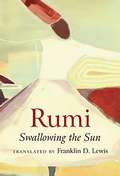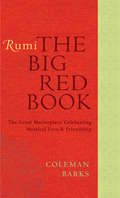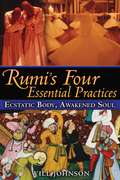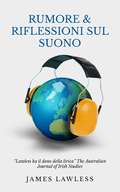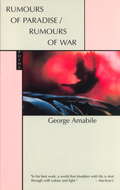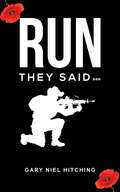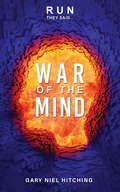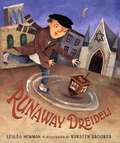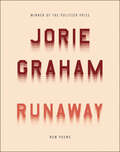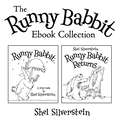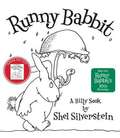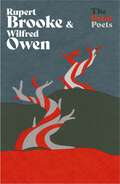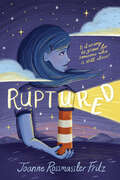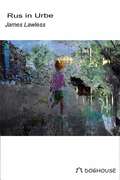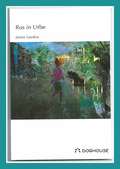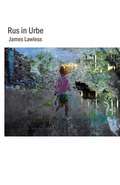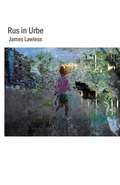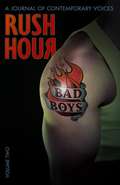- Table View
- List View
Rumi's World: The Life and Works of the Greatest Sufi Poet
by Annemarie SchimmelThis book (previously published as I Am Wind, You Are Fire) celebrates the extraordinary career of Persia's great mystical poet, Rumi (1207-1273), through the story of his life, along with an enlightening examination of his ecstatic verse. Rumi lived the quiet life of a religious teacher in Anatolia until the age of thirty-seven, when he came under the influence of a whirling dervish, Shams Tabriz, and was moved to a state of mystical ecstasy. One of the results of this ecstasy was a prodigious output of poems about the search for the lost Divine Beloved, whom Rumi identified with Shams. To symbolize this search, Rumi also invented the famous whirling dance of the Melevi dervishes, which are performed accompanied by the chanting of Rumi's poems. Professor Schimmel illuminates the symbolism and significance of Rumi's vast output and offers her own translations of some of his most famous poems.
Rumi: A New Translation of Selected Poems
by Rumi Farrukh DhondyChampioned by the likes of Madonna, Donna Karan, and Deepak Chopra, Rumi has won such a following in this country that a few years ago he was proclaimed our bestselling poet. But translations that have popularized the work of this thirteenth-century Sufi mystic have also strayed from its essence. In this new translation, Farrukh Dhondy seeks to recover both the lyrical beauty and the spiritual essence of the original verse. In poems of love and devotion, rapture and suffering, loss and yearning for oneness, Dhondy has rediscovered the Islamic mystic of spiritual awakening whose quest is the key to his universal appeal. Here is at once a great poet of love, both human and divine, and the authentic voice of a moderate Islam--a voice that can resonate in today's turbulent, fundamentalist times.
Rumi: Bridge to the Soul
by Coleman Barks2007 is the "Year of Rumi," and who better than Coleman Barks, Rumi's unlikely, supremely passionate ambassador, to mark the milestone of this great poet's 800th birthday? Barks, who was recently awarded an honorary doctorate in Persian language and literature by the University of Tehran for his thirty years of translating Rumi, has collected and translated ninety new poems, most of them never published before in any form. The result is this beautiful edition titled Rumi: Bridge to the Soul. The "bridge" in the title is a reference to the Khajou Bridge in Isphahan, Iran, which Barks visited with Robert Bly in May of 2006--a trip that in many ways prompted this book. The "soul bridge" also suggests Rumi himself, who crosses cultures and religions and brings us all together to listen to his words, regardless of origin or creed. Open this book and let Rumi's poetry carry you into the interior silence and joy of the spirit, the place that unites conscious knowing with a deeper, more soulful understanding.
Rumi: Soul Fury
by Coleman BarksThis is how the heart sounds. Do not change the melody, this now, you and I, here together. Let this being with each other be heart-sound.The evocative, spiritual poetry of thirteenthcentury Sufi mystic Rumi has inspired people for centuries, and Coleman Barks' stunning translations are unparalleled. This exquisite new collection speaks to the mystery of soul friendship, specifi cally between Rumi and Shams Tabriz, and universally in the relationships we all share.Jelaluddin Rumi and Shams Tabriz met in 1244 and began a mystical, divine friendship, one not bound to time and space and despite their diff erences. Where Rumi was introspective, loving, and embodied peace and kindness, Shams was wild, brash, and honest--full of a fi ery passion Barks calls "soul fury." Together they shared an eternal friendship that resulted in Rumi's luminous quatrains and the wise Sayings of Shams Tabriz, giving language to the delight of true friendship.s their divine yearnings. Joyous and contemplative, provocative and playful, Rumi: Soul Fury is a sterling addition to the modern Rumi oeuvre, and is sure to be embraced by his wide and devoted readership.
Rumi: Swallowing the Sun
by Franklin Dean LewisTimeless and eternal, the poetry of Jalal al-Din Rumi is loved the world over, making him the best selling poet from America to Tajikistan. In this beautifully presented volume of new translations, Franklin D. Lewis draws from the great breadth of his work, in all its varied aspects and voices. Working directly from the original Persian, Lewis brings to this translation not only the latest scholarship in Persian and English, but a deftness and lightness of touch that allows for a profound sensitivity to Rumi's mystical and philosophical background.Complete with a detailed introduction and notes, this is a perceptive, insightful, and deeply moving collection that will prove inspirational to both keen followers of Rumi's work and readers discovering the great poet for the first time.
Rumi: The Big Red Book
by Coleman BarksConsidered one of the masterpieces of world literature, The Big Red Book is perhaps the greatest work of Rumi, the medieval Sufi mystic who also happens to be the bestselling poet in America. Rumi was born in 1207 to a long line of Islamic theologians and lawyers on the eastern edge of the Persian Empire in what is now Afghanistan. In order to escape the invading Mongol armies of Genghis Khan, his family moved west to a town now found in Turkey, where he eventually became the leader of a school of whirling dervishes. It was a fateful day in 1244 when he met Shams Tabriz, a wild mystic with rare gifts and insight. The renowned scholar Rumi had found a soul mate and friend who would become his spiritual mentor and literary muse. "What I had thought of before as God," Rumi said, "I met today in a human being." Out of their friendship, Rumi wrote thousands of lyric poems and short quatrains in honor of his friend Shams Tabriz. They are poems of divine epiphany, spiritual awakening, friendship, and love. For centuries, Rumi's collection of these verses has traditionally been bound in a red cover, hence the title of this inspired classic of spiritual literature.
Rumi: The Big Red Book
by Coleman BarksConsidered one of the masterpieces of world literature, The Big Red Book is perhaps the greatest work of Rumi, the medieval Sufi mystic who also happens to be the bestselling poet in America. Rumi was born in 1207 to a long line of Islamic theologians and lawyers on the eastern edge of the Persian Empire in what is now Afghanistan. In order to escape the invading Mongol armies of Genghis Khan, his family moved west to a town now found in Turkey, where he eventually became the leader of a school of whirling dervishes. It was a fateful day in 1244 when he met Shams Tabriz, a wild mystic with rare gifts and insight. The renowned scholar Rumi had found a soul mate and friend who would become his spiritual mentor and literary muse. "What I had thought of before as God," Rumi said, "I met today in a human being."Out of their friendship, Rumi wrote thousands of lyric poems and short quatrains in honor of his friend Shams Tabriz. They are poems of divine epiphany, spiritual awakening, friendship, and love. For centuries, Rumi's collection of these verses has traditionally been bound in a red cover, hence the title of this inspired classic of spiritual literature.
Rumi’s Four Essential Practices: Ecstatic Body, Awakened Soul
by Will JohnsonPoems and commentary that open the door for a new generation to experience the ecstatic and embodied spiritual truths contained in Rumi’s poetry • Reveals how the four practices of eating lightly, breathing deeply, moving freely, and gazing intently can invoke the divinity within us all • Explains how these practices dissolve the self’s need for identity so that we may experience a state of transcendent ecstasy and union with the divine • Takes Rumi’s path to finding God from theoretical to embodied practices The great thirteenth-century Sufi mystic and poet Jalaluddin Rumi began his life as an orthodox Islamic believer but felt that to fully experience complete union with the divine he must abandon institutionalized religion and its prescribed forms of worship. Surrendering his will to his overriding urge for a much more immediate, intuitive, and compelling union with the divine, he found that by manipulating certain behavioral aspects of his physiology--eating lightly, breathing deeply, moving freely, and gazing raptly--he was capable of loosening the rigid confines of the self, thereby overriding its limitations and achieving a transcendent merging with his own divinity. His message is simple: if you wish to affect the spirit, you must first make changes in the way your body responds to the world. Through clearly written commentary interspersed with Rumi’s beautiful poems, this book details these four practices in a very precise way. As such, it is a sweet and open invitation to follow the examples set forth in order to embark upon one’s own path of inner illumination. The freshness of Rumi’s poetry dissolves the 700 years that separate his life from our own time, making his message as pertinent today as when he walked the streets of Konya, Anatolia (present-day Turkey), reciting his inspiring verse. This book allows us, through Rumi’s gentle guidance, to touch the face of God that resides deep within us all.
Rumore & Riflessioni sul Suono
by James Lawless Melissa CamottiChe cos'è il rumore? Cosa succede quando ti entra in testa? In Riflessioni sul Suono, una storia divertente puntellata di pathos, James Lawless ci mostra col suo tipico stile umoristico alcuni degli effetti del suono sulla società moderna, seguiti da Rumore, una poesia dalle tinte costantemente scure che esplora la devastazione che una cacofonia fuori controllo può causare nelle persone sensibili.
Run They Said...: Poetry of a Fortunate Airman
by Gary Niel HitchingRun They Said… Well, they may have said ‘Run’, but it certainly didn’t happen: he stayed to face life’s twists and turns head-on; made bad decisions, good decisions and decisions which actually saved his life. Not a hero by any account but a fortunate airman, he found himself the witness of countless unfortunate events, strangely coming out of one and straight into another, all of them recorded in poetry and written with experience. From war zone to new baby, from the Royal household to living next to a pond full of poo in Afghanistan, the writing of Run They Said may have just kept this fortunate airman alive, giving him the chance to explain the ups and downs of a changing world, a changing life and changing attitudes to sexuality, warfare and love.
Run they said.... War of the Mind
by Gary Niel HitchingMental health is a journey, it has lots of ups and downs. Just like life, we never know which way it will go: from happiness to sadness, from worry to not a care in the world. There are books, films and discussions which try to tell you which way to turn, when realistically you are the only one who holds the answers. Sometimes, though, you need a bit of help – and that’s what I got from the strangest place, inside my head! A poet: whenever there was trouble, he appeared and led me back to happiness, helping me on my journey. My friend the poet plotted my pathways and shaped my future, carving my destiny as we went through the darkest periods of my life with the only support coming from within and from the pen, which indeed is mightier than the sword. It can write or draw happier days and times, even if the parchment is used and damaged. From darkness into light through inner strength and the spoken and written word… “Si vis pacem, para bellum.”
Runaway Dreidel!
by Lesléa Newman"In this rhyming tale in the style of "The Night Before Christmas," a family's preparations for Chanukah are disrupted by a wildly spinning dreidel." There was holiday hustling and bustling galore. Papa was shining the silver menorah, Mama was wrapping a gift for Aunt Dora." A delightful introduction to the customs of Hanukkah.
Runaway: New Poems
by Jorie GrahamAn NPR Best Book of the YearA new collection of poetry from one of our most acclaimed contemporary poets, Pulitzer Prize winner Jorie GrahamIn her formidable and clairvoyant new collection, Runaway, Jorie Graham deepens her vision of our futurity. What of us will survive? Identity may be precarious, but perhaps love is not? Keeping pace with the desperate runaway of climate change, social disruption, our new mass migrations, she struggles to reimagine a habitable present—a now—in which we might endure, wary, undaunted, ever-inventive, “counting silently towards infinity.” Graham’s essential voice guides us fluently “as we pass here now into the next-on world,” what future we have surging powerfully through these pages, where the poet implores us “to the last be human.”
Runny Babbit and Runny Babbit Returns: The Runny Babbit Ebook Collection
by Shel SilversteinRunny Babbit and Runny Babbit Returns: The Runny Babbit Ebook Collection has descriptive copy which is not yet available from the Publisher.
Runny Babbit: A Billy Sook
by Shel SilversteinRunny Babbit lent to wunch And heard the saitress way, "We have some lovely stabbit rew -- Our Special for today." From the legendary creator of Where the Sidewalk Ends, A Light in the Attic, Falling Up, and The Giving Tree comes an unforgettable new character in children's literature. Welcome to the world of Runny Babbit and his friends Toe Jurtle, Skertie Gunk, Rirty Dat, Dungry Hog, Snerry Jake, and many others who speak a topsy-turvy language all their own. So if you say, "Let's bead a rook That's billy as can se," You're talkin' Runny Babbit talk, Just like mim and he.
Rupert Brooke & Wilfred Owen: Heartbreakingly beautiful poems from the First World War poets (The Great Poets)
by Rupert Brooke Wilfred OwenIf I should die, think only this of me:That there's some corner of a foreign fieldThat is for ever England.From The Soldier to Anthem for Doomed Youth Rupert Brooke and Wilfred Owen are two of the best-loved poets from the heroic lost generation of the First World War. Brooke's work was well-known before the war, with the now iconic lines:'Stands the Church clock at ten to three?And is there honey still for tea?' from The Old Vicarage, Grantchester. And Wilfred Owen, awarded the Military Cross, had been writing poetry since he was ten years old.This superb collection is the perfect introduction to two of our greatest poets.
Rupert Brooke & Wilfred Owen: Heartbreakingly beautiful poems from the First World War poets (The Great Poets)
by Rupert Brooke Wilfred OwenIf I should die, think only this of me:That there's some corner of a foreign fieldThat is for ever England.From The Soldier to Anthem for Doomed Youth Rupert Brooke and Wilfred Owen are two of the best-loved poets from the heroic lost generation of the First World War. Brooke's work was well-known before the war, with the now iconic lines:'Stands the Church clock at ten to three?And is there honey still for tea?' from The Old Vicarage, Grantchester. And Wilfred Owen, awarded the Military Cross, had been writing poetry since he was ten years old.This superb collection is the perfect introduction to two of our greatest poets.
Ruptured
by Joanne Rossmassler FritzThe sensitive, suspenseful story of a family coping with a life-changing tragedy, told in stunning verse.Is it wrong to grieve for someone who is still alive? Claire&’s mom and dad don&’t talk to each other much anymore. And they definitely don&’t laugh or dance the way they used to. Their tense, stilted stand offs leave thirteen-year-old Claire, an only child, caught in the middle. So when the family takes their annual summer vacation, Claire sticks her nose in a book and hopes for the best. Maybe the sunshine and ocean breeze will fix what&’s gone wrong. But while the family is away, Claire&’s mother has a ruptured brain aneurysm—right after she reveals a huge secret to Claire. Though she survives the rupture, it seems like she is an entirely different person. Claire has no idea if her mom meant what she said, or if she even remembers saying it. With the weight of her mom&’s confession on her shoulders, Claire must navigate fear, grief, and prospects for recovery.Will her mom ever be the same? Will her parents stay together? And if the answer to either question is yes, how will Claire learn to live with what she knows? This beautifully written novel speaks to kids&’ fears and credits their strength, and stems from the author&’s incredible experience surviving two ruptured aneurysms.
Rus In Urbe
by James Lawless Anabel López MolinaIntroducciónEn esta colección de poemas, Rus in Urbe, James Lawless explora el mundo a su alrededor tanto en el paisaje rural como citadino. En ocasiones presenta sus vívidas imágenes en inglés (en esta edición en español) y en otras las presenta en irlandés; esta comodidad con los dos lenguajes enriquece la colección como en "La otra mitad" / An Leath Eile- Te escucho sumando / en el lenguaje antiguo... Éistim leat ag comhaireamh / sa tsean teanga ..Palabras que llevan al lector a la magia de la siguiente línea:- la suave luz,...'le gile séimh trathnóna.El poema le da una cálida bienvenida a muchas capas de sentido, música y magia. Esta dualidad ofrece la inmediatez y dispersión del inglés en una sola página, y la melodía y el ritmo del irlandés en la página opuesta. Los poemas son ricos en imagines, como en "Estampas parisinas" donde observamos ecos de Yeats:-líneas de edad en su cara, / trazan la ruta de su vida. que contrasta con...-Los jóvenes en patineta esquivan el viento / navegan las olas de la ciudad.James Lawless presenta breves e inmediatos vistazos a la vida diaria y los transforma en vívidas memorias, con un trasfondo de tensión tan hábilmente capturados como en - ¿Cómo podré saber / si me iré o me quedaré?La frecuente presencia de aves es un símbolo de movimientos entre el ambiente rural y el urbano.Rus in Urbe es una colección de poemas con fuerza en su destreza, escaso en palabras y rico en capas de sentido.
Rus In Urbe
by James Lawless Licia BragaIn questa raccolta di poesie, Rus in Urbe, James Lawless esplora il mondo che lo circonda nella sua componente rurale e in quella cittadina. Talvolta i vividi scorci dei suoi paesaggi ci vengono descritti in inglese, talvolta in irlandese. L'armonia data dal combinarsi delle due lingue non può che arricchire la raccolta. In L'altra metà / An Leath Eile - ti sento fare addizioni / in lingua antica ... Éistim leat ag comhaireamh / sa tsean teanga ... le parole accompagnano e introducono il lettore alla magia del verso - la luce morbida, ...'le gile séimh trathnóna. Le poesie accolgono tra le diverse profondità di significato, musicalità e magia. Questo dualismo offre l'immediatezza e l'essenzialismo inglese su una pagina, la melodia e il ritmo irlandese sulla facciata opposta. Sono poesie ricche di immagini. In Vignette Parigine - I segni dell' età sul viso/ a tracciare il percorso della sua vita in contrasto con... - Il giovane sullo skateboard schiva le folate di vento, / cavalcando le onde della città. Si possono riconoscere echi di Yeats. James Lawless offre brevi e immediati sguardi sula vita quotidiana e li trasforma in vividi ricordi, con un sottofondo di tensione così appropriatamente colto nel verso. - Come posso dire / se resterò / o se me ne andrò? La presenza frequente di uccelli è un simbolo di movimenti tra la il paesaggio rurale e la città. Rus in Urbe è una raccolta poetica di incredibile maestria, essenziale nelle parole e ricca di profondità di significato.
Rus In Urbe
by James Lawless Max Gonçalves Leite FerreiraNesta coletânea de poemas, Rus in Urbe, James Lawless explora o mundo à sua volta, em sua paisagem rural e urbana. Às vezes seus vívidos vislumbres são apresentados em inglês e outras vezes em irlandês. Essa facilidade com ambas as línguas enriquece a coleção. Em A outra metade / Leath Eile – Ouço você somando /na língua antiga … Éistim leat ag comhaireamh / sa tsean teanga .. as palavras levam o leitor à magia do verso – a suave luz …‘le gile séimh trathnóna. Os poemas oferecem um bem-vindo acesso às várias camadas de significado, música e magia. Essa dualidade fornece o imediatismo e a dispersão da língua inglesa em uma página e a melodia e o ritmo da língua irlandesa na página oposta. Há uma riqueza de imagens nos poemas. Em Vinhetas parisienses – marcas da idade no rosto,/ mapeando a rota de sua vida. contrasta com... – Os jovens de skate desviam-se do vento,/ surfando nas ondas da cidade. Aqui há ecos de Yeats. James Lawless apresenta breves e imediatos olhares sobre o dia-a-dia e os transforma em uma vívida memória, com correntes de tensão subjacentes tão bem capturadas em – Como posso dizer.../ Fico/ ou vou? A presença frequente dos pássaros é um símbolo da movimentação entre os cenários rural e urbano. Rus in Urbe é uma coletânea de poemas com um forte trabalho artesanal, de poucas palavras e rica em camadas de significados.
Rus in Urbe
by James LawlessDans cette collection de poèmes, Rus in Urbe, James Lawless explore le monde autour de lui, ses paysages ruraux et citadins. Son regard acéré s'expose parfois en anglais, d'autres fois en irlandais. Cette aisance dans les deux langages enrichisit sa collection.
Rush Hour: Bad Boys (A Journal of Contemporary Voices Volume #2)
by Michael CartBold, innovative, and eclectic--that's Rush Hour,the place for thought-provoking stories, essays, art, and poems from today's most distinguished voices, both established and new. "Bad Boys" is the hard-hitting theme of Volume Two. Here are drifters, pranksters, jocks, rebels, monsters, and heroes living life on the edge. In knockout stories by Jackie Woodson and E. R. Frank, artwork by John O'Brien and Chris Gall, essays by Robert Lypsite and Jack Gantos, and much more, bad boys sometimes play by the rules, often misbehave, but always grab our attention. This second issue solidifies the reputation of this unprecedented, pulsating journal, published twice a year and focused on themes today's readers care about most. "Rush Hour is ... a vehicle for sharp, challenging new writing that aims for a discerning and literate young adult audience the way the best literary magazines have long done for older readers."
